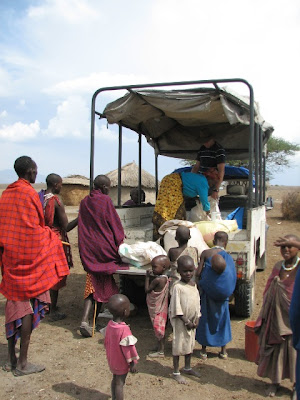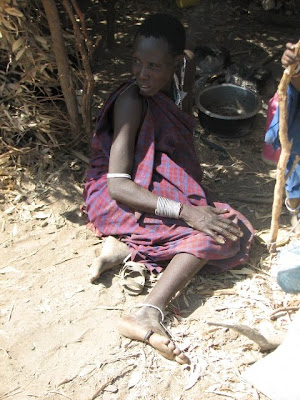Then it rains, the grass grows, new shoots appear, there is colour again and everyone has a new spring in their step. Our village is already green and lush but sadly it isn’t so everywhere yet.
We heard that it had rained in Maasaini and that the goats were better and the cows starting to eat again. Sadly when we went out there with food, we found it as dry and barren as ever. We were struck suddenly by how welcome the splash of reds and blues on the Maasai is in an otherwise brown land.

When we were camping there earlier in the year, we drank our early morning tea watching herds of cattle and donkeys walk past with gazelle and zebra in the background, all munching as they went. It was one of those moments that imprints itself on your heart because it’s almost too perfect to digest.

This is Melau with his first wife Tito. Then comes Nini, Naramatesho, Namayani, Natemuta, Satuma and Nosikito – yes seven wives, who have 37 children between them. And what is even more amazing is that they all say he is a good husband – an incredible feat for one man! Added to the 45 of his immediate family, are his blind mother, his daughters in law, his grandchildren, his brothers and aunt................ and those are just the ones we managed to identify.
Sadly, they have lost all 350 of their cows during this drought but when we turned up with food for the boma, there was nothing but smiles and genuine gratitude. They even killed one of their precious remaining goats in our honour to say thank you. It would have been great to have shared the privilege and the goat with all you givers!

We are not talking about starvation here, we’re talking about daily hunger, the sort that makes a man pick up every last grain of maize that falls to the ground as we pour it out.
Cows are like a savings account. Goats and sheep are the current account that you dip into as you have need. Some keep chickens as ‘loose change’ to buy and sell although they don’t actually eat them.

In one boma we found people so fast asleep that we had to shake them awake, having walked in through the open door of their huts. It was a Saturday afternoon, they had eaten on Friday and were passing the time until Tuesday when they could take a goat to the local market and buy food.
In another we were given a mug full of cold maize gruel as an expression of their appreciation – there is never any hesitation in extending their hospitality and sharing what little they have.
Again, thank you so much all of you who have given towards this food distribution. We wish we could 'beam you in' for an hour or two to be with us there!






